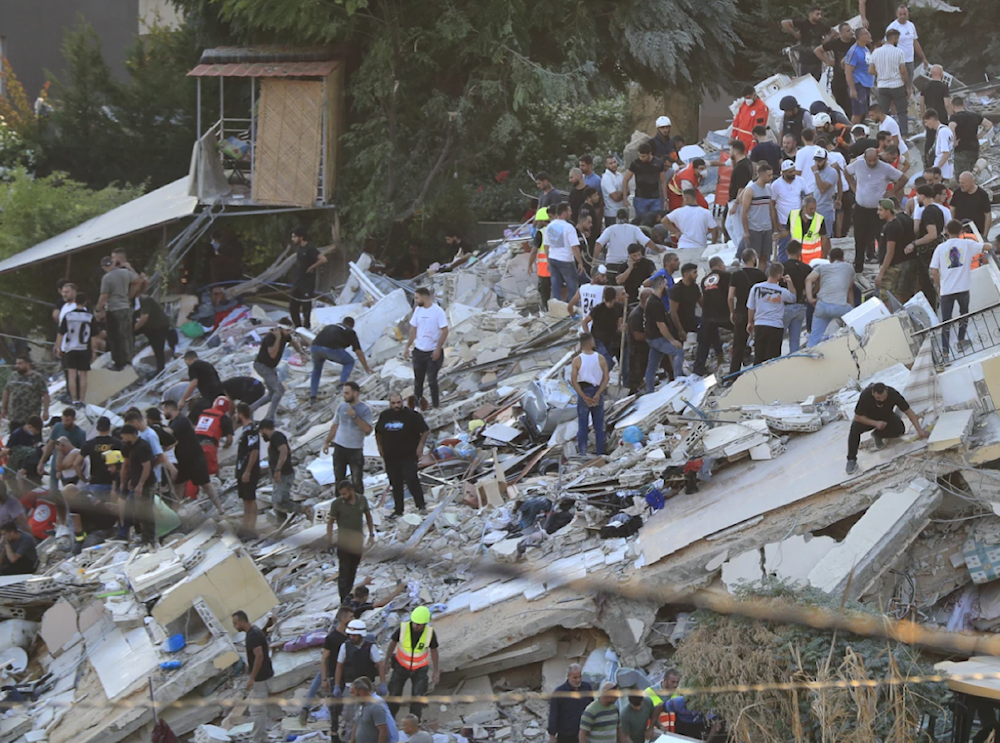Gaza in ruins, Lebanon besieged: Little defense for Israeli actions
The Guardian columnist Nesrine Malik believes the only serious threat is to the stability of the Middle East, which "Israel" is rapidly jeopardizing.
-

People and rescue workers search for victims after an Israeli airstrike hit two adjacent buildings in Ain el-Delb neighborhood east of the southern port city of Sidon, Lebanon on September 29, 2024. (AP)
According to Nesrine Malik, a popular justification for "Israel's" aggressive actions through Palestine and the region is the false claim that it is surrounded by hostile nations seeking its destruction.
Like many, this explanation for its maniacal ways is not only untrue, but a distortion of reality.
Malik writes in The Guardian that the events of the last several months, as well as the recent assault on Lebanon, illustrate that "Israel" poses a threat to its neighbors, and not vice versa.
Malik recalls the killing of 558 Lebanese people in one day, 50 of them children. First responders, humanitarian workers, first responders, and government personnel were also not spared.
After the attack that killed Hezbollah leader Sayyed Hassan Nasrallah on Friday destroyed six Beirut residential buildings, she contends that "a Gaza in microcosm is quickly unfolding," with thousands fleeing for safety, traumatized children, heavy fatalities, and an escalation in which there is no limit to the civilian lives that may be lost to achieve "Israel's" aims.
According to Malik, "Israel" excuses their murders with a defense that, as usual, relies on worries of an "existential threat". However, in terms of genuine and serious dangers to regional stability, "Israel is the pugnacious out-of-control force," has just launched a campaign in Lebanon and assassinated Sayyed Nasrallah against the clear desires of the United States.
Gaza a critical test for Arab countries
Rather than seeking "Israel's" annihilation, several regional governments have recently deemed the problem settled or at least shelved, mostly on "Israel's" terms. Egypt signed a peace pact with the occupation more than 40 years ago, Jordan made peace in 1994, with "Israel" still occupying the West Bank. In the Abraham Accords, the United Arab Emirates, Bahrain, Morocco, and Sudan all agreed to normalize ties with "Israel" and recognize its sovereignty, or to start the process. Insiders have told Malik that Saudi Arabia does not consider the war on Gaza a major game-changer and that if and when it ends, it will continue toward normalization.
Malik views the Gaza conflict as a critical test for Arab countries dealing with their own internal challenges.
Saudi Arabia wants to focus on domestic development rather than global politics, and Qatar maintains close ties with the US Jordan struggles economically, hosting many Syrian refugees and relying heavily on US aid. Meanwhile, Syria remains silent amid Israeli attacks on its soil, and Lebanon grapples with its political crises.
Malik questions why the occupation continues to portray itself as besieged in a territory that has either "long been domesticated or has too many of its own problems to care?"
The author notes that "Israel's" siege on Gaza, what is widely condemned as apartheid in the West Bank, its continued occupation of territories, and its illegal settlement expansion are the source of "Israel's" security challenges, the heart of the region's "rising tensions."
As long as these conditions prevail, uprisings, both justifiable and illegitimate, will continue from the intifada until Operation al-Aqsa Flood.
Fatal confrontations between Palestinians and Israeli occupation forces(IOF) and Israeli settlers will also occur, provoking a cycle of retaliation from nations such as Iran and resistance groups like the Lebanese Resistance and the Yemeni Armed Forces.
Pentagon raises troop readiness fearing potential Iranian attack
Amid "Israel's" increasingly aggressive actions in the region and its airstrikes on civilians which threaten an all-out war, the US has also increased the readiness of its soldiers.
The US Department of Defense stated on Sunday that it has increased the readiness of extra US soldiers to respond swiftly to a potential assault by Iran and its allies against US personnel and interests in the Middle East.
US Secretary of Defense Lloyd Austin "increased the readiness of additional U.S. forces to deploy, elevating our preparedness to respond to various contingencies," a Pentagon statement read.
It emphasized that the Pentagon "maintains robust and integrated air-defense capabilities across the Middle East, ensuring the protection of U.S. forces operating in the region."
The statement boasted that the US has the capacity to deploy forces "on short notice" and maintains a "significant amount" of capability in the region amid the evolving security situation.
According to the Pentagon, "Secretary Austin made clear that should Iran, its partners, or its proxies use this moment to target American personnel or interests in the region, the United States will take every necessary measure to defend our people."
This comes as the Israeli occupation requested that the United States act to deter Iran from waging any retaliatory attacks over its assassination of Hezbollah Secretary-General Sayyed Hassan Nasrallah, Israeli and US officials told Axios' Barak Ravid on Saturday.
The Israeli war has now been raging on for nearly a year, with the ongoing Gaza genocide and the brutal aggression on Lebanon claiming the lives of tens of tens of thousands of people, combined with full US complicity.
Meanwhile, Iran has been taking a less confrontational approach, according to Axios. However, the assassination of such a major ally while flagrantly violating Lebanon's sovereignty is expected to lead to a major Iranian response.

 5 Min Read
5 Min Read








